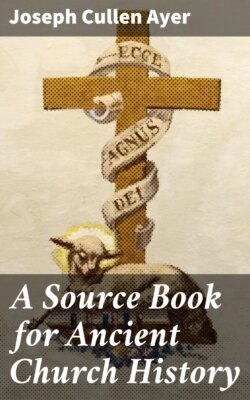Читать книгу A Source Book for Ancient Church History - Joseph Cullen Ayer - Страница 48
На сайте Литреса книга снята с продажи.
§ 16. Moral Ideas in the Post-Apostolic Period
ОглавлениеTable of Contents
Christians were convinced that their religion made the highest possible moral demands upon them. They were to live in the world, but remain uncontaminated by it (cf. supra, § 11). This belief even candid heathen were sometimes forced to admit (cf. Pliny's correspondence with Trajan, supra, § 7). The morality of the Christians and the loftiness of their ethical code were common features in the apologies which began to appear in the post-apostolic period (cf. The Apology of Aristides, infra, § 20, a). Christianity was a revealed code of morals, by the observance of which men might escape the fires of hell and obtain the bliss of immortality (a) (cf. infra, § 30). At the same time there was developed a tendency toward asceticism, by which a higher excellence might be obtained than the law required of ordinary Christians (b, c). This higher morality was not without its compensations; superior merit was recognized by God, and was accordingly rewarded; it might even be applied to offset sins committed (d, e). This last idea is to be traced to the book of Tobit (cf. also James 5:20; I Peter 4:8). The fuller development is to be found in the theology of Tertullian and Cyprian (v. infra, § 39).
